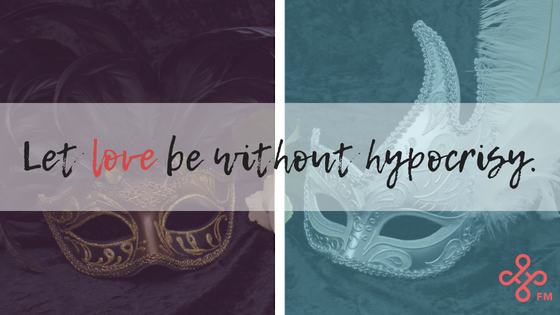
“Let love be without hypocrisy. Abhor what is evil; cling to what is good.” Romans 12:9
In ancient Greek theatre, actors commonly played multiple roles. To portray different characters in a play required them to wear various masks. So, to “play the hypocrite” in Greek theatre literally meant to wear more than one mask. Over the centuries, the word hypocrite has become synonymous with being “two faced.”
With this in mind, Paul writes, “Let love be without hypocrisy.” In other words, “Love should not be two faced.” One of the greatest tensions created in relationships, especially in marriage, is when there is duplicity. Duplicity, simply put, is when a person’s public face does not match their private face. That is to say that masks are being worn in public to cover what is actually happening in private.
Does your public face align with your private face?
Hypocrisy further exists in relationships when one’s private face does not match their personal face. This occurs when those who know and love us best see a different person than the one we see when we look in the mirror. They see our private face. When we look in the mirror we see our personalface. When we are “two faced” in these two areas, once again there is duplicity. There is hypocrisy.
Does your private face align with your personal face?
We have observed that many in the millennial generation appear to have little interest in the organized Church. We’re convinced it’s not Jesus or spiritual matters they are rejecting. We believe it’s what the Church has come to represent to them. This is what they have rejected. Why? Because Millennials began to see the apparent hypocrisy their parent’s lives represented. The masks their parents wore to church did not match the masks they wore privately at home. There was obvious duplicity. What their parents stated they believed publicly did not match what their parents lived privately. So, the religious life of their parents appeared to be totally irrelevant and pointless. Therefore, as young adults many Millennials have chosen simply to walk away from the Church.
A key to living and loving without hypocrisy can be found in Paul’s admonition, “Abhor what is evil; cling to what is good.” Think about the last time conflict arose between you and another person. Was it not easier to cling to what that person did or said wrong than to cling to what they did or said right?
In conflict, it comes rather natural for us to, “Cling to what is evil and abhor what is good.” To love without hypocrisy we must do the exact opposite, “Abhor what is evil; cling to what is good.” Don’t cling to the evil, cling to the good.
You may want to push back on this principle. But, let us remind you that a broken clock is right twice a day. So, regardless of what the other person has said or done to you, there are still some things they have done right. Focus on those things as you seek to bring resolution to the things that are wrong.
The principle of accentuating the positive, practicing an attitude of gratitude, and clinging to what is good was demonstrated powerfully to us recently. While we were speaking at the Women’s Prison in Alto, Ga. an inmate commented to us that she began each day listing ten things she was thankful for. When we asked her the effect it had on her life, she stated that it totally changed her attitude and outlook. Though she was in a situation most of us would greatly deplore, she had learned the value of “abhorring what is evil and clinging to what is good.”
- Do you tend to wear “masks”? If so, why?
- Does your public face match your private face?
- Does your private face match your personal face?
- If duplicity exists anywhere in your life, what has been the result?
- Growing up, what was your view of the Church? What affect, if any, did your parent’s lives have on your view of the Church?
- In your relationships, what comes more natural, clinging to what is good in the person or clinging to what is evil in the person?

